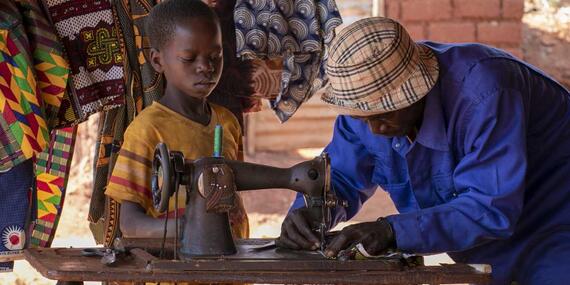Today's top news: Central African Republic, Haiti, Sudan and Japan

Central African Republic
The Humanitarian Coordinator Mohamed Ag Agoya briefing reporters today in Geneva said the humanitarian situation remains critical with 3.4 million – or 56 per cent of the population – in need of humanitarian assistance.
Displacement continues due to a volatile security situation with repeated military confrontations between various armed actors. One in five Central Africans is either internally displaced or a refugee in a neighbouring country.
Mr. Ag Ayoya said that the conflict in neighbouring Sudan has meant the arrival of nearly 14,000 Sudanese asylum seekers and Central African repatriates in the north-east. it has also halted commercial traffic across the border, putting additional pressure on the limited resources available to the 130,000 extremely vulnerable people in the region.
Last year, the humanitarian community provided assistance to 1.9 million people. In the first three months of 2023 alone, 658,000 people were reached with live-saving assistance.
This year we need US$533 million to assist 2.4 million people. We will also continue to support people arriving from Sudan and the host communities.
The humanitarian appeal is currently 25 per cent funded.
Haiti
Haiti was hit by floods and landslides over the weekend, due to torrential rains. Authorities say that at least 42 people were killed, more than 37,000 people affected, and some 19,000 displaced.
The impact was worst in the West, including the capital Port-au-Prince, and the southwest. Overall, seven of Haiti’s 10 departments were affected.
We are supporting the Civil Protection General Directorate to assess needs and coordinate the emergency response.
Alongside Haitian institutions, we and our humanitarian partners are gearing up to deliver assistance, including shelter and food supplies, drinking water, and hygiene kits and facilities.
The extent of the damage is still being assessed, but the situation is extremely worrying, given the hurricane season has only just begun.
Even before the landslides and flooding, half the population of Haiti needed humanitarian assistance. We urge donors to scale up support for the country’s Humanitarian Response Plan, which is only one-fifth funded so far of $720 million required.
Sudan
We are moving humanitarian relief for millions of people in need around the country, despite the ongoing violence.
Some 68 humanitarian partners are providing life-saving assistance and protection across all of Sudan's 18 states. This includes UN organizations, Sudanese and international NGOs, as well as the Red Crescent Society.
The UN Children’s Fund (UNICEF) has delivered more than 2,500 tons of health, nutrition, water and sanitation supplies, including in areas where the fighting continues. This assistance will benefit at least 1.6 million children. More than 600 tons of lifesaving nutrition aid have reached 11 states – enough for UNICEF and partners to treat more than 45,000 children suffering from severe wasting in the coming months.
Since the conflict began, the UN Refugee Agency has set up nearly 1,000 tents in White Nile, Kassala, Gedaref and North Darfur states.
We are also supporting the response in neighbouring countries hosting people fleeing the violence in Sudan. Over the weekend, the World Health Organization delivered 10 tons of essential medicines and health supplies to Egypt. That’s enough to treat 50,000 new arrivals suffering from non-communicable diseases and severe acute malnutrition.
Japan
The Assistant Secretary-General for Humanitarian Affairs, Joyce Msuya, began a five-day visit to Japan today to explore how to enhance cooperation on humanitarian action.
Ms. Msuya, who also serves as Deputy Emergency Relief Coordinator, took part in a first-ever Strategic Dialogue today with Japan’s Foreign Ministry to discuss mounting humanitarian crises and innovative approaches to address them.
While in Tokyo, she will meet with other senior Japanese Government officials, as well as with representatives of the Japan International Cooperation Agency (JICA) and aid organizations.
Ms. Msuya will address students at the University of Tokyo’s Graduate Program on Human Security and the Research Center for Sustainable Peace and speak about current humanitarian challenges and opportunities. She will also speak at the International Christian University High School about what young people can do to help people affected by crises around the world.
